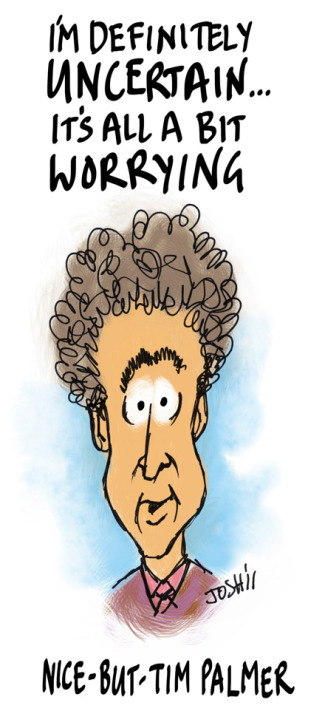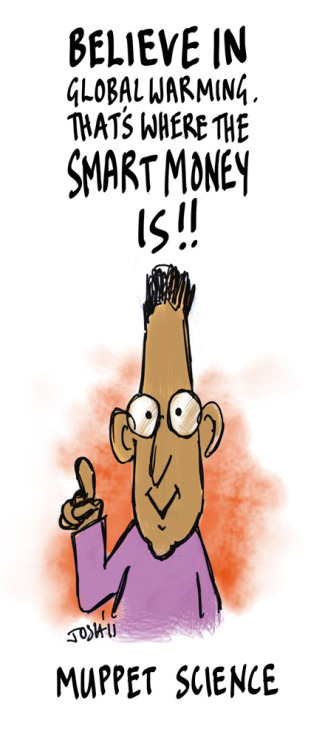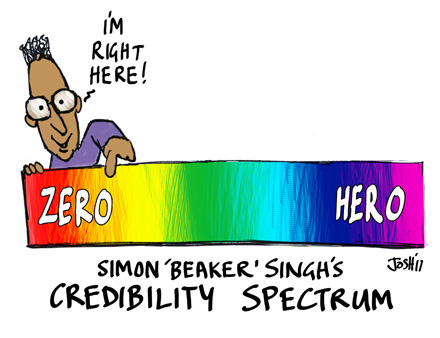 Bishop Hill
Bishop Hill Courtillot
 Mar 31, 2011
Mar 31, 2011  Climate: Sceptics
Climate: Sceptics Lots of people are telling me to watch this - I haven't had a chance yet though. What do you reckon?
Books
Click images for more details
A few sites I've stumbled across recently....
 Bishop Hill
Bishop Hill  Mar 31, 2011
Mar 31, 2011  Climate: Sceptics
Climate: Sceptics Lots of people are telling me to watch this - I haven't had a chance yet though. What do you reckon?
 Bishop Hill
Bishop Hill  Bishop Hill
Bishop Hill  Mar 31, 2011
Mar 31, 2011  Climate: Surface
Climate: Surface The LA Times interviews Richard Muller about BEST, his new project to measure the Earth's temperature. Santer and Trenberth pop up with a spectacular display of the kind of grubby behaviour normally associated with the worst kind of political spin doctor.
"I am highly skeptical of the hype and claims," said Kevin Trenberth, who heads the Climate Analysis Section of the National Center for Atmospheric Research, a university consortium. "The team has some good people but not the expertise required in certain areas, and purely statistical approaches are naive. I suspect they have an agenda."
The Koch donation, to many, confirms those suspicions. "Why would a scientist accept funding from an organization with no interest in advancing the science?" asked Benjamin Santer, an atmospheric scientist at Lawrence Livermore National Laboratory.
 Bishop Hill
Bishop Hill  Mar 31, 2011
Mar 31, 2011  Climate: Mann
Climate: Mann Michael Mann has written to top US newspaper the Payson Roundup defending his honour...
Editor:
An individual named Terry Putnam did a grave disservice to your readers by making false and defamatory statements about me and my climate scientist colleagues...
I always liked the good old days when letters to the editor began "Sir", or perhaps "Dear Sir".
 Josh
Josh  Mar 30, 2011
Mar 30, 2011  Josh
Josh 
 Josh
Josh  Mar 30, 2011
Mar 30, 2011  Josh
Josh 
 Josh
Josh  Mar 30, 2011
Mar 30, 2011  Josh
Josh  Simon Singh, at the Spectator debate, introduced himself as the least credible of the six speakers. Somewhat comically he then presented the audience with a credibility spectrum of people and institutions representing the alarmist and skeptical sides of the debate.
Simon Singh, at the Spectator debate, introduced himself as the least credible of the six speakers. Somewhat comically he then presented the audience with a credibility spectrum of people and institutions representing the alarmist and skeptical sides of the debate.
But if he is not credible, why would we believe what he says?
More cartoons by Josh here
 Bishop Hill
Bishop Hill  Mar 30, 2011
Mar 30, 2011  Climate: Sceptics
Climate: Sceptics  Climate: other
Climate: other I'm back home now, and I need to set down my thoughts on the Spectator debate. I don't intend to go into too much detail, because I need sleep more than I need to write right now.
I was a bit disappointed overall - none of the presentations managed to combine slick presentation with a strong coherent argument and many of them were not really about the motion at hand: "The global warming concern is over, time for a return to sanity".
Here are some of the things that stuck in my mind. The first was the sense of anger in the auditorium. People were just very, very annoyed about what was going on. There were times when the warmists on the stage looked taken aback by the heat that they were receiving.
 Bishop Hill
Bishop Hill  Mar 28, 2011
Mar 28, 2011  Blogs
Blogs I'm off on my travels from Monday morning. I should be back on Wednesday evening.
 Bishop Hill
Bishop Hill  Mar 28, 2011
Mar 28, 2011  Climate: CRU
Climate: CRU  Quotes
Quotes Paul Krugman, stand-up comedian:
Back in 2009 climate skeptics got hold of more than a thousand e-mails between researchers at the Climate Research Unit at Britain’s University of East Anglia. Nothing in the correspondence suggested any kind of scientific impropriety...
 Bishop Hill
Bishop Hill Some excerpts from the Beddington's letters to Lawson:
The significance of urbanisation on the global temperature record is not contested by the vast majority of climate scientists. Most stations are not affected by the urban heat island effect and there are well-established ways of taking the effect into account for stations that are (such as comparing temperatures on still and windy nights and excluding urban stations). I refer you to my previous response for further information on this issue.
I should clarify that I did not seek to defend the original hockey stick analysis; I am aware that there are issues and uncertainties associated with it.
...you suggested that scientists at CRU delayed the release of temperature data they held. I hope that I can clarify this by laying out the situation as I understand it. The majority of the data in the CRU dataset are derived from the same freely-available raw data sets used by NOAA and NASA. However, the CRU dataset was compiled with the aim of comprehensiveness and therefore also includes data derived from station data obtained directly from countries, institutions and scientists on the understanding that this would not be passed on.
It is true that global average temperature has remained roughly constant over the past decade, but this in no way undermines the evidence that greenhouse gases are causing warming
[In response to Lawson's suggestion that models didn't predict the slowdown in warming] It remains very difficult, however, to predict year to year changes caused by short-term, internal processes in the climate system such as ENSO – primarily because the climate system is chaotic.
 Bishop Hill
Bishop Hill  Mar 27, 2011
Mar 27, 2011  Climate: Surface
Climate: Surface The Guardian carries a report about the correspondence between Nigel Lawson and Sir John Beddington over Lawson's book, An Appeal to Reason.
This is fascinating stuff and the whole article needs to be read.
 Bishop Hill
Bishop Hill
The story was sourced from here, and from where the original correspondence can be seen. I would recommend reading it.
 Bishop Hill
Bishop Hill Tim Worstall, writing at the Adam Smith Institute blog, looks at a new way of measuring the (alleged) benefits of recycling - looking at the carbon footprint - and finds much to applaud.
Full marks to "Zero Waste Scotland" for this idea. For as we keep being told, we've got to recycle in order to stop the planet burning up. Therefore, as you would think people would already have cottoned on to, we should be measuring what we recycle and how by how well doing so stops the planet burning up. That everyone should have done this earlier is true but more joy in heaven over one sinner repentant etc.
Tim's prediction is that once the new scheme has demonstrated unequivocally that all this recycling we are doing has a higher carbon footprint than landfilling it will be quietly dropped.
Meanwhile, Andrew Bolt-style questioning is catching on, at least in one small corner of England. The Englishman has written to Zero Waste Scotland to find out how much their scheme will cool the planet.
 Bishop Hill
Bishop Hill  Mar 25, 2011
Mar 25, 2011  BBC
BBC  Climate: Sceptics
Climate: Sceptics The BBC's Thought for the Day, the religious three minute spot each morning, today covered the trustworthiness of statistics, in what might be read as a commentary on Sir John Beddington's call for intolerance.
File below.
 Bishop Hill
Bishop Hill  Mar 25, 2011
Mar 25, 2011  Bureaucrats
Bureaucrats  Climate: Sceptics
Climate: Sceptics There has been some correspondence in Nature, picking up on Sir John Beddington's earlier comments about being intolerant of people who dare to question scientists. Two letters were published together with Beddinton's response. Here's an excerpt from one of the letters, from Brian Wynne
